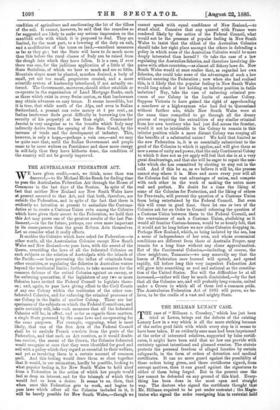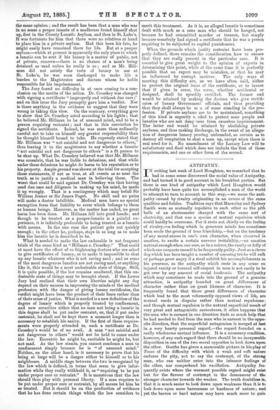THE HILLMAN LUNACY CASE.
THE case of " Hillman v. Crosskey," which has just been tried at Lewes, brings out the defects of the existing Lunacy Law in a way which is all the more striking because of the entire good faith with which every step in it seems to have been taken. If an evidently sane man had been imprisoned at the order of interested relatives, supported by false certifi- cates, it might have been said that no law can provide with certainty against intentional and planned evasion. The statute protects the personal freedom of alleged lunatics by certain safeguards, in the form of orders of detention and medical certificates. It can no more guard against the possibility of these orders being given, and these certificates signed, from corrupt motives, than it can guard against the signatures to either of them being forged. But in the present case the law cannot be defended on any ground of this kind. Every- thing has been done in the most open and straight way. The doctors who signed the certificate thought that Mr. Hillman required to be put under restraint ; the Magis- trates wbo signed the order consigning him to restraint held
the same opinion ; and the result has been that a man who was in no sense a proper inmate of a madhouse found himself shut up, first in the County Lunatic Asylum, and then in St. Luke's.
It was fortunate for him that there were no relatives at hand to place him in a private asylum. Had this been his fate, he might easily have remained there for life. But at a pauper asylum—which at present is apparently the only place to which a lunatic can be sent if his lunacy is a matter of public, not of private, concern—there is no chance of a man's being
detained as -mad unless he really is so ; and as Mr. Hill- man did not satisfy the tests of lunacy in use at St. Luke's, he was soon discharged to make life a burden to the Magistrates and doctors whom he holds responsible for his imprisonment.
The Jury found no difficulty in at once coming to a con- clusion on the merits of the action. Dr. Crosskey was charged
with signing a certificate " improperly and without due care ;" and on this issue the Jury promptly gave him a verdict. Nor is there anything in the evidence to suggest that they were wrong in taking this view. On the contrary, everything goes to show that Dr. Crosskey acted according to his lights ; that he believed Mr. Hillman to be of unsound mind, and to be a person requiring restraint ; and that in this conviction he signed the certificate. Indeed, he was more than ordinarily careful not to take on himself any greater responsibility than he thought himself bound to take. He expressly stated that Mr. Hillman was " not suicidal and not dangerous to others," thus leaving it to the magistrates to say whether a lunatic " not suicidal and not dangerous to others" is a fit person to be shut up. What Dr. Crosskey believed was that Mr. Hillman was eccentric, that he was liable to delusions, and that while under these delusions he might do harm to his reputation or to his property. Ample ground was shown at the trial for accepting these statements, if not as true, at all events as so near the truth as to justify a medical man in believing them. The worst that could be said against Dr. Crosskey was that having used due care and diligence in making up his mind, he made it up wrongly. That is a contingency which may befall Sir William Jenner or Sir James Paget. No skill and no pains will make a doctor infallible. Medical men have no special exemption from that liability to error which belongs to them as human beings. Moreover, as the matter has ended, no great harm has been done. Mr. Hillman fell into good hands ; and though to be treated as a pauper-lunatic is a painful ex- perience, it is infinitely preferable to being treated as a lunatic with means. In the one case the patient gets out quickly enough ; in the other he, perhaps, stays in so long as to make him the lunatic he is described to be.
What is needed to make the law endurable is not frequent trials of the same kind as " Hillman v. Crosskey." That could at most have the effect of so frightening doctors who are asked to give certificates of lunacy, as to make it impossible to shut up any lunatic whatever who is not raving mad ; and as some of the most dangerous lunatics are not raving mad, or anything like it, this would be a most undesirable state of things. Still, it is quite possible, if the law remains unaltered, that this un- desirable state of things may be brought about. If the Lewes Jury had realised that their own liberties might any day depend on their success in impressing the minds of the medical profession with the danger of giving lunacy certificates, the verdict might have been the product of their fears rather than of their sense of justice. What is needed is a new definition of the degree of lunacy which is properly treated by confinement, and new securities either that no man not being a lunatic in this degree shall be put under restraint, or, that if put under restraint, he shall not be kept there a moment longer than is necessary to establish his sanity. If the first of these require- ments were properly attended to, such a certificate as Dr. Crosskey's would be of no avail. A man "not suicidal and not dangerous to others" would not be held to come under the law. Eccentric he might be, excitable he might be, but not mad. As the law stands, you cannot condemn a man to confinement simply because he is " of unsound mind." Neither, on the other hand, is it necessary to prove that his being at large will be a danger either to himself or to his neighbours. A middle stage between the two is recognised by the law which is defined, in terms that seem to give infor- mation while they really withhold it, as "requiring to be put under proper care or restraint." It is monstrous that the law should thus play with personal liberty. If a man requires to be put under proper care or restraint, by all means let him be so treated. But it should be on the production of evidence that he has done certain things which the law considers to
merit this treatment. As it is, an alleged lunatic is sometimes dealt with much as a sane man who should be hanged, not because he had committed murder or treason, but simply because somebody had signed a certificate that he was a person requiring to be subjected to capital punishment.
When the grounds which justify restraint have been pro- perly defined, there remains the consideration how to ensure that they are really present in the particular case. It is essential to give great weight to the opinion of experts in determining this point, while at the same time it is perfectly possible that an expert may be mistaken, or that he may be influenced by corrupt motives. The only ways of meeting this difficulty are, as we have often said, either to protect the original issue of the certificate, or to insure that if given in error, the error, whether accidental or designed, shall be speedily rectified. The former end would be attained by making the doctors who give certifi- cates of lunacy Government officials, and thus providing that they shall always be arn of some standing in the pro- fession. If private asylums are to be maintained, something of this kind is urgently n eded to protect sane people and lunatics who are not dangerous from causeless imprisonment. The latter end would be attained by abolishing private asylums, and thus making discharge, in the event of an allega- tion of dangerous lunacy proving unfounded, so certain as to destroy all temptation to shut a man up, except when there is real need for it. No amendment of the Lunacy Law will be satisfactory and final which does not include the first of these requirements, and one or other form of the second.



































 Previous page
Previous page